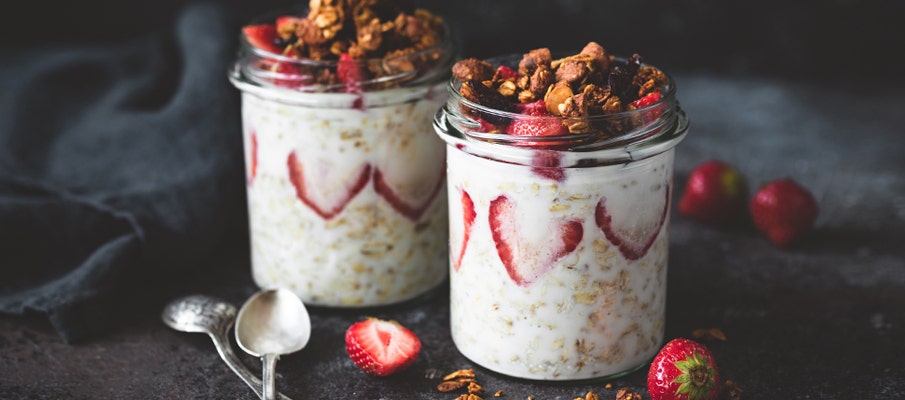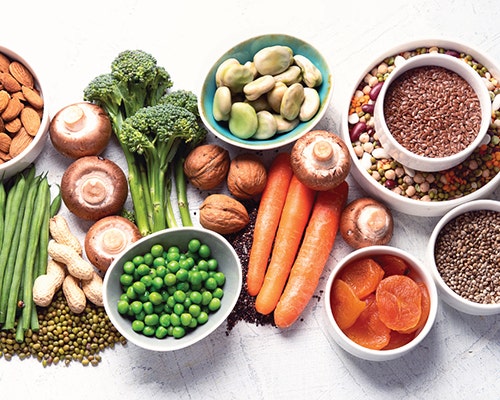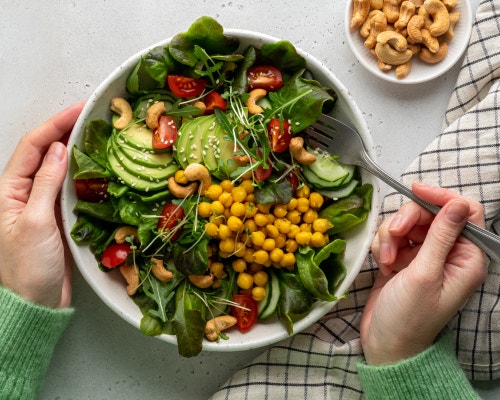Gut Healthy Snacks for Happier Bellies
- 7/20/23


Normal digestion is an important part of whole-body health. Not only does your belly feel good when your gut is working well, but you’re giving your other organs a chance to be happily nourished. A healthy gut can digest food as it should, launching nutrients to all the cells in your system.
Choosing the right snacks can be a great way to improve your digestive health. Consider functional foods that are good sources of:
- Fiber, adding bulk to your stool to keep things moving along. Whole grains, legumes, fruits, and vegetables are great sources of fiber.
- Prebiotics, which contain special types of fiber that help your microbiome thrive!
- Probiotics, or fermented foods that host living good bacteria to improve the balance in your gut.
- Water, an often-forgotten key to digestive health. Aside from obvious liquids like water, soups, and juice, fruits and vegetables are often high in water content.
Here are some versatile snack ideas full of gut-friendly nutrients to help keep your digestive system on track.
Veggie Sticks with Hummus
Packed with fiber, vegetables with hummus make a tasty gut-friendly combo. Hummus, which is mostly blended chickpeas and sesame seed butter, is full of resistant starch, which your microbiome will love. The produce section of major grocery stores now offers a wide variety of yummy hummus flavors like garlic and roasted red pepper.
Any vegetable you personally enjoy are great choices, but certain veggies rank a little higher on the list of microbiome favorites. For example, jicama and asparagus are both good sources of inulin. Inulin is a special fiber that humans can’t digest but that our good gut bugs can transform into valuable nutrients.
Jicama is a juicy root vegetable that simply needs to be peeled and chopped into dipping sticks. Asparagus can be eaten raw, but many people prefer to lightly steam it first, then plunge the stalks into icy water so that they maintain a bit of their snap.
Fruit with Yogurt
Try dipping your favorite fruit in unsweetened yogurt for a sweet and sour treat. Apples are particularly high in pectin, a type of prebiotic fiber. Bananas are also a good choice since they offer resistant starch and inulin.
It’s important to read the label when it comes to choosing yogurt. Look for brands that advertise active and live cultures on the container. These words mean that the yogurt contains probiotic bacteria that may be a helpful addition to your microbiome.
Overnight Oats
The options are endless with overnight oats! Oats are a fabulous source of soluble fiber, which draws water to the stool during digestion, keeping things running right.
The basic recipe is one part liquid (like milk or almond beverage) to one part old-fashioned oats. Mix the two ingredients well in a mason jar. Add your favorite toppings like berries, bananas, nuts, or seeds. Cover it, and put it in the fridge. After just a few hours, you’ll have a grab-and-go snack!
Bonus: Walnuts, chia seeds, and ground flax seeds are wise overnight oats additions. All are sources of omega-3 fatty acids, a healthy fat that is also a prebiotic.
Kefir Smoothie
Kefir is another popular probiotic food. Found in the dairy section of your local grocery store, it’s a thick, milk-based liquid that has been valued in many cultures for centuries.
Because plain kefir can be too tart for some, adding your favorite flavors can make it more enjoyable. Try adding bananas (remember they contain prebiotics), unsweetened cocoa powder, and peanut butter. Or, maybe blending in a handful of the sweetest blueberries or strawberries would make it the perfect snack for you!
Taking care of your gut is a good investment in overall health. By mindfully choosing foods that can add valuable nutrients to your digestive system, you’ll have a happier belly which will help you feel your best.
If you’re having trouble getting these gut-healthy nutrients from food, Garden of Life offers various supplements to help you meet your needs!
References:
-
Your Digestive System & How it Works. (2023, February 27). National Institute of Diabetes and Digestive and Kidney Diseases; NIDDK - National Institute of Diabetes and Digestive and Kidney Diseases.
-
Akbar, A., & Shreenath, A. P. (2022). High Fiber Diet. StatPearls Publishing.
-
Davani-Davari, D., Negahdaripour, M., Karimzadeh, I., Seifan, M., Mohkam, M., Masoumi, S. J., Berenjian, A., & Ghasemi, Y. (2019). Prebiotics: Definition, Types, Sources, Mechanisms, and Clinical Applications. Foods (Basel, Switzerland), 8(3). https://doi.org/10.3390/foods8030092
-
Probiotics Health Professional Fact Sheet. Office of Dietary Supplements. Updated 2 June 2022. Available from https://ods.od.nih.gov/factsheets/Probiotics-HealthProfessional/.
-
Nakamura Y, Watanabe H, Tanaka A, Yasui M, Nishihira J, Murayama N. Effect of Increased Daily Water Intake and Hydration on Health in Japanese Adults. Nutrients. 2020;12(4):1191. Published 2020 Apr 23. doi:10.3390/nu12041191
-
Kadyan, S., Sharma, A., Arjmandi, B. H., Singh, P., & Nagpal, R. (2022). Prebiotic Potential of Dietary Beans and Pulses and Their Resistant Starch for Aging-Associated Gut and Metabolic Health. Nutrients, 14(9). https://doi.org/10.3390/nu14091726
-
González-Vázquez, M., Calderón-Domínguez, G., Mora-Escobedo, R., Salgado-Cruz, M. P., Arreguín-Centeno, J. H., & Monterrubio-López, R. (2022). Polysaccharides of nutritional interest in jicama (Pachyrhizus erosus) during root development. Food Science & Nutrition, 10(4), 1146–1158.
-
Hamdi, A., Viera-Alcaide, I., Guillén-Bejarano, R., Rodríguez-Arcos, R., Muñoz, M. J., Monje Moreno, J. M., & Jiménez-Araujo, A. (2022). Asparagus Fructans as Emerging Prebiotics. Foods (Basel, Switzerland), 12(1). https://doi.org/10.3390/foods12010081
-
Jiang, T., Gao, X., Wu, C., Tian, F., Lei, Q., Bi, J., Xie, B., Wang, H. Y., Chen, S., & Wang, X. (2016). Apple-Derived Pectin Modulates Gut Microbiota, Improves Gut Barrier Function, and Attenuates Metabolic Endotoxemia in Rats with Diet-Induced Obesity. Nutrients, 8(3), 126.
-
Patterson, M. A., Maiya, M., & Stewart, M. L. (2020). Resistant Starch Content in Foods Commonly Consumed in the United States: A Narrative Review. Journal of the Academy of Nutrition and Dietetics, 120(2), 230–244.
-
Korczak, R., Kocher, M., & Swanson, K. S. (2020). Effects of oats on gastrointestinal health as assessed by in vitro, animal, and human studies. Nutrition Reviews, 78(5), 343–363.
-
Costantini, L., Molinari, R., Farinon, B., & Merendino, N. (2017). Impact of Omega-3 Fatty Acids on the Gut Microbiota. International Journal of Molecular Sciences, 18(12). https://doi.org/10.3390/ijms18122645
-
Bourrie, B. C. T., Willing, B. P., & Cotter, P. D. (2016). The Microbiota and Health Promoting Characteristics of the Fermented Beverage Kefir. Frontiers in Microbiology, 7, 647.





